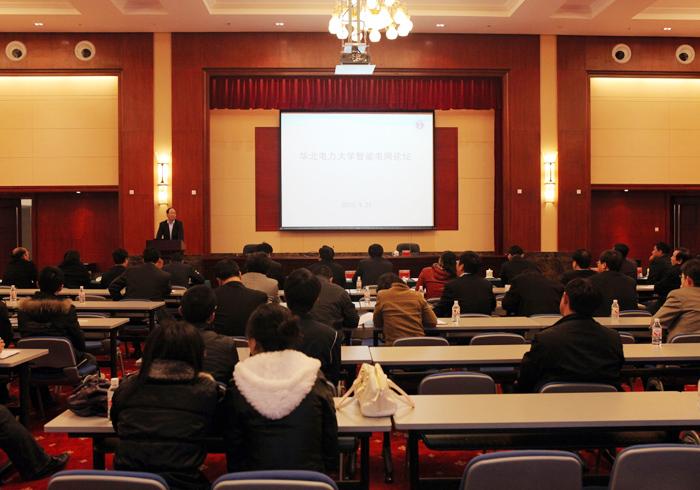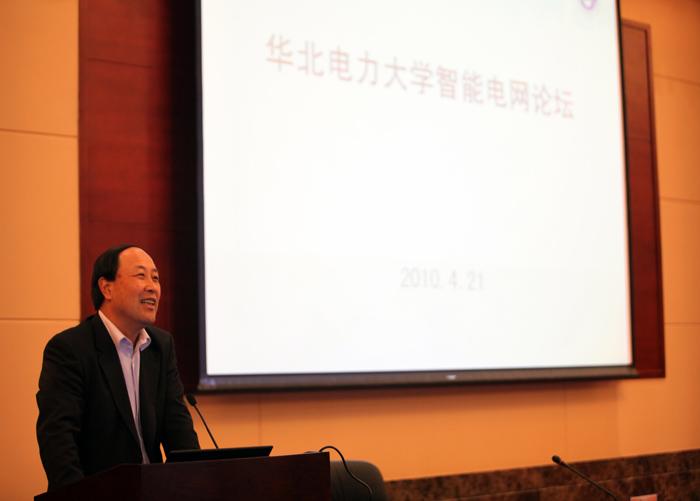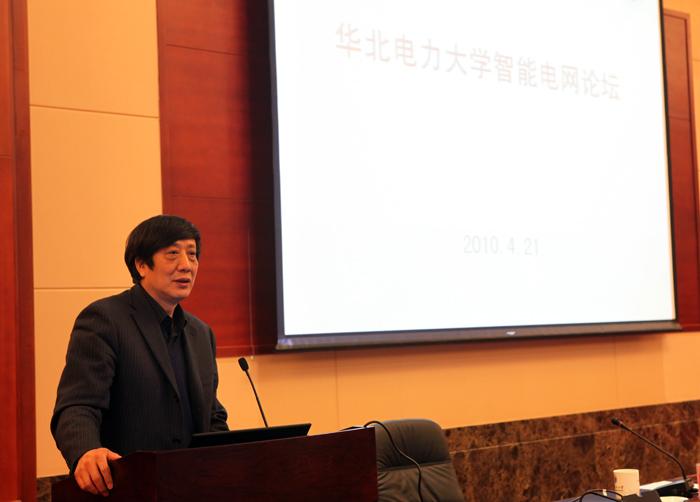In order to better carry out research on the smart grid and to play a better role in the field of energy and power, NCEPU held the Smart Grid Forum in the Multifunctional Hall of the main building on April, 21st. Wu Zhigong, Liu Jizhen and other leaders concerned as well as some experts in the field of smart grid participated in the forum. Vice President Li Chengrong presided over the forum.

Vice president Li Chengrong first introduced the purpose and significance of the forum. He pointed out that the smart grid is a new grid as well as an important platform for future energy system, with the basis of the physical grid nad integrating the advanced power electronics technology, sensor measurement technology, communication technology, information technology and control technology,. This forum aimed at discussing the developing strategy and goals of the smart grid of our school so as to provide a strong support for the construction of a high level university.
Huang Shaofeng, Professor of the Electrical and ElectronicEngineeringSchool, described the profile of the smart grid construction in China. He said that the smart grid was also a hot issue under discussion in the Academy of Engineering. In China, to make our grid more intelligent and flexible was our next technology development strategy. He analyzed problems the smart grid was faced with, such as energy conservation and economy, security and reliability, compatibility with renewable energy, etc. from the aspects of the current situation, the causes, the effects and the research on a variety of important technology.
Cui Xiang, Professor of the Electrical and ElectronicEngineeringSchool, gave a report entitled Overview of the National 12 5 Smart Grid Technology Development Strategy . In his report, he analyzed the development status, strategic needs and development priority of smart grid in China. He also put forward the following recommendations: First, the school should take the smart grid technology as a major school development strategy and carry out a comprehensive planning. Second, make full use of all the resources that our school share with other organizations to achieve important breakthroughs on the key technologies. Third, form a research team on the key technologies of the smart grid and to make outstanding contributions in all kinds of pilot demonstration projects so as to lay the foundation for greater accomplishments.
In the succeeding exchange period, representatives from other schools reported their advantages and focuses on the development of smart grid.
Professor Niu Dongxiao, Dean of the Economics and ManagementSchool, made a presentation entitled Research on Issues in Economic Management of the Smart Grid . He pointed out that in the construction of the smart grid, we should not only attach importance on the technical issues, but also economic management issues. In this regard, he analyzed 15 economic management issues such as intelligence forecasting, intelligence scheduling, smart grid evaluation, green resources planning and the intensive management of human, financial and material resources etc. from the aspects of contents, results and team.
Xu Hong, Dean of the Energy and PowerEngineeringSchool, gave a presentation entitled Some Thoughts on the Smart Grid . He pointed out that the smart power system was the development trend of China s electric power systems and the Energy and PowerEngineeringSchool had held several research seminars to discuss future development direction. The main work at present could be divided into two phases: before the implementation of TOU price and after the implementation of TOU price. The Energy and PowerEngineeringSchool had formed five technical teams on load regulation technology, electric machine and power grid coordination, distributed function system, thermal storage technology, cool thermal storage technology and hydrogen and fuel cells. He also introduced the work the school had already carried out, the work the school could participate and the work the school would carry out in the future. At last, he proposed that all the schools should give play to strengths and conduct further and deeper cooperation in the construction of the smart grid.
Professor Liu Shi, Dean of the Control Science and EngineeringSchool spoke at the forum. He put forward some suggestions on the research of the Smart Grid and said that the Control Science and Engineering School would give full play to its advantages and provide computing and control technology support for the smart grid in such aspects as wind speed prediction, load scheduling, modeling analysis and control of smart-grid-based large-scale complex network control system, automatic generation control under communication networks, theory and application of energy saving and generation.
Prof. Xu Jinliang, Dean of Renewable Energy School, delivered a report entitled Study on Renewable Energy Technology in Smart Grid , in which he analyzed the properties of wind turbine generator (WTG) and technology on integration into the power system, wind power prediction of wind farm, wind energy assessment and status monitoring, and the research interests, content and achievements of photovoltaic power generation and new thin film cells.
Wang Zengping, Dean of Electrical and ElectronicEngineeringSchool, gave a report on the research project in progress about smart grid construction. He pointed out that the established Smart Grid Research Center, led by experts of high authority like Cui Xiang, Li Chengrong, Xiao Xiangning, and Zhang Jianhua, was composed of eight research labs, such as Advanced Power Transmission Technology Research Lab, Power Equipment Intellectualization Research Lab, New Energy Power Grid Research Lab, Intelligent Distribution Network Research Lab and Intelligent Utility of Electric Power Research Lab. Prof. Wang stated that the Electrical and Electronic Engineering School would try to to make contributions to Comprehensive Strong Smart Grid construction by making breakthroughs in such areas as EHV/UHV transmission technology and electro-magnetic problems concerned, key technology of new energy integration into the power system, power transmission equipment intellectualization and status assessment, power system protection and security control based on wide area information, intelligent distribution network and utility of electric power, smart grid communication technology and information processing.

In the period of free discussion, professors, including Huang Guohe, Cui Xiang, Zhang Lizi, Xiao Xiangning, made a speech respectively. They agreed that smart grid construction was not only a simple technical move but also a government s political, economic and scientific and technological strategic deployment. The strategic development of smart grid provided an unprecedented opportunity for NCEPU and we should seize it and strive for breakthroughs in key areas.
President Liu Jizhen gave important instructions concerning research on the smart grid. He thought the Forum, with a clear theme and a novel form, was a discussion and study platform for school leaders and scholars to discuss the smart grid construction. He expressed his hope that all attendants would invite senior consultants to make further study. Relevant sections and leaders would study and put the suggestions proposed in the Forum into practice.
President Liu considered that the smart grid was aimed at building an intellectualized power system, which provide people with a new way to use electricity in daily life as well as in production and which would lead to a great change in the fields of economy, society, science and technology. He hoped that all departments would take part in the construction and exert implications.
As for how to better serve the smart grid construction, President Liu said that we should try to achieve comprehensive promotion and strive for breakthroughs in key areas. First, to find out a good breakthrough point we should learn about our advantages and make better use of them to strengthen NCEPU. Second, to carry out the mission we ought to specify the development priority and content and then integrate the strength of the faculties and teams. He stressed that the smart grid had something to do with our university s development strategy and goal. The Forum was meaningful for NCEPU in the process of promoting smart grid research, and in turn fostering the integral construction and development of NCEPU. We should take advantage of our strength in energy and power disciplines and talents and make our contributions.

Wu Zhigong, Secretary of NCEPU Party Committee, stated that this Forum was of great significance in the course of building a high-level university; it was of enormous meaningfulness in further specifying the aim and orientation of high-level university construction. This Forum was only a starting point, we should make the aim and orientation more condense and clear. In addition, we should give full play to our advantages and contribute to the smart grid construction.
Subsequently, he expressed that we would integrate new energy, smart grid, cooperation between school and enterprises, and international cooperation, and combine our major task to our country s needs. He hoped that all functional departments and schools could seize the opportunity of smart grid construction to promote the spirit of modern university, make a further plan to integrate all kinds of energy, make clearer orientation and in turn speed up high-level university construction.
He emphasized that the smart grid construction was a political, economic as well as diplomatic and financial issue. It was a lifetime chance for NCEPU to bring its advantages into full play and meet national strategic needs. In the end, Wu called for the cadres to make common efforts to build college civilization according to national main strategic changes.
Related News
- NCEPU Held Appointment Ceremony for Professor Wang Zhongdong
- Graduation Ceremony and Degree Awarding for Postgraduates
- Graduates Scientific and Cultural Exchange Forum between NCEPU and Germany UNIVERSITY OF APPLIED SCIENCES Hamburg Opened
- Academic Symposium Held between NCEPU and UK Engineering and Physical Sciences Research Council
Photos
More>>history
- Professor Julian P.Chang of Harvard University
- Sun Lamei from NCEPU Ranked the First in the Female s Half-Marathon
- Vice Chancellor of the University of Adelaide Australia Prof. Richard Russell
- The Construction of the National Engineering Laboratory for Biomass Power
- China-United Kingdom Biomass Co-Firing Workshop Held in NCEPU
Traditions
- A Signing Ceremony for Cooperation Agreement and Official Launch of the Joint
- President David Grant of Cardiff University Visited NCEPU
- Fifth CRIS Conference Hold in NCEPU
- Research Seminar of Direct-Fired Biomass Power Generation Held In NCEPU
- A Delegation Led by Vice President Lei Yingqi Visited Universities in France and
arts
- NCEPU Signed a Cooperative Agreement with China Institute of Water Resources and
- Prof. Hugh MaCann of Engineering and Physics School of Manchester University
- NCEPU Students Made Great Achievements in the Third National Energy-Saving and
- NCEPU Signed the Strategic Cooperative Frame Agreement with Department of
- President Liu Jizhen Attended State Grid Company Ultra-high Voltage (UHV) AC/DC





